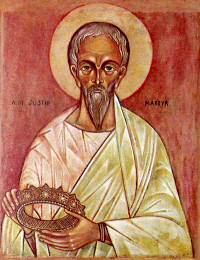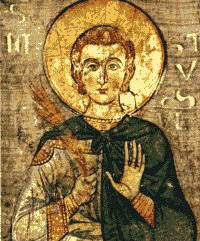Ordinary Time: June 1st
Memorial of the Blessed Virgin Mary, Mother of Church; Memorial of St. Justin, martyr
Other Commemorations: Feast of Our Lord Jesus Christ, the Eternal High Priest (particular calendars)
Free eBook:

|
| Free eBook: Witness of Suffering |
» Enjoy our Liturgical Seasons series of e-books!
Pope Francis has decreed that the ancient devotion to the Blessed Virgin Mary, under the title of Mother of the Church, be inserted into the Roman Calendar.
The liturgical celebration, B. Mariæ Virginis, Ecclesiæ Matris, will be celebrated annually as a Memorial on the day after Pentecost.
St. Justin, apologist and martyr, was one of the most important Christian writers of the second century. He himself tells how his study of all the schools of philosophy led him to Christianity, and how he dedicated his life to the defense of the Christian faith as "the one certain and profitable philosophy."
St. Justin is particularly celebrated for the two Apologies which he was courageous enough to address in succession to the persecuting emperors Antoninus and Marcus Aurelius. One of them contains a description of the rites of baptism and the ceremonies of Mass, thus constituting the most valuable evidence that we possess on the Roman liturgy of his day. He was beheaded in Rome in 165. Justin is also referred to as "the Philosopher."
According to the 1962 Missal of St. John XXIII the Extraordinary Form of the Roman Rite, today is the feast of St. Angela Merici. Her feast is now celebrated on January 27. St. Justin's feast was celebrated on April 14.
Mary, Mother of the Church
By issuing the Decree on the celebration of the feast of Mary, Mother of the Church, Pope Francis wishes to promote this devotion in order to “encourage the growth of the maternal sense of the Church in the pastors, religious and faithful, as well as a growth of genuine Marian piety”.
The decree reflects on the history of Marian theology in the Church’s liturgical tradition and the writings of the Church Fathers.
 It says Saint Augustine and Pope Saint Leo the Great both reflected on the Virgin Mary’s importance in the mystery of Christ.
It says Saint Augustine and Pope Saint Leo the Great both reflected on the Virgin Mary’s importance in the mystery of Christ.
“In fact the former [St. Augustine] says that Mary is the mother of the members of Christ, because with charity she cooperated in the rebirth of the faithful into the Church, while the latter [St. Leo the Great] says that the birth of the Head is also the birth of the body, thus indicating that Mary is at once Mother of Christ, the Son of God, and mother of the members of his Mystical Body, which is the Church.”
The decree says these reflections are a result of the “divine motherhood of Mary and from her intimate union in the work of the Redeemer."
Scripture, the decree says, depicts Mary at the foot of the Cross (cf. Jn 19:25). There she became the Mother of the Church when she “accepted her Son’s testament of love and welcomed all people in the person of the beloved disciple as sons and daughters to be reborn unto life eternal.”
In 1964, the decree says, Pope Paul VI “declared the Blessed Virgin Mary as ‘Mother of the Church, that is to say of all Christian people, the faithful as well as the pastors, who call her the most loving Mother’ and established that 'the Mother of God should be further honoured and invoked by the entire Christian people by this tenderest of titles.’”
Things to Do:
St. Justin
Justin, the son of Priscus, was a Greek by race, and was born at Nablus in Palestine. He passed his youth in the study of letters. When he grew to manhood he was so taken with the love of philosophy and the desire of truth, that he became a student of philosphy and examined the teaching of all the philosophers. He found in them only deceitful wisdom and error. He received the light of heaven from a venerable old man, who was a stranger to him, and embraced the philosophy of the true Christian faith. Henceforth he had the books of Holy Scripture in his hands by day and night, and his soul was filled with the divine fire enkindled by his meditations. Having thus acquired the excellent knowledge of Jesus Christ, he devoted his learning to the composition of many books explaining and propagating the Christian faith.
Among the most famous of the works of Justin are his two Apologies or Defenses of the Christian faith. These he offered in the Senate to the Emperor Antoninus Pius and his sons, together with Marcus Antoninus Verus and Lucius Aurelius Commodus, who were cruelly persecuting the followers of Christ. By these Apologies and his vigorous disputations in defense of the faith he obtained a public edict from the government to stay the slaughter of the Christians. But Justin himself did not escape. He had blamed the wicked life led by Crescens the Cynic, who caused him to be accused and arrested.  He was brought before Rusticus, the Prefect of Rome, and questioned concerning the doctrine of the Christians. Whereupon he made this good confession in the presence of many witnesses: "The right doctrine which we Christian men do keep with godliness is this: that we believe that there is one God, the maker and creator of all things, both those which are seen and those which bodily eyes do not see; and that we confess the Lord Jesus Christ, the Son of God, who was of old foretold by the Prophets, and who is to come to judge all mankind."
He was brought before Rusticus, the Prefect of Rome, and questioned concerning the doctrine of the Christians. Whereupon he made this good confession in the presence of many witnesses: "The right doctrine which we Christian men do keep with godliness is this: that we believe that there is one God, the maker and creator of all things, both those which are seen and those which bodily eyes do not see; and that we confess the Lord Jesus Christ, the Son of God, who was of old foretold by the Prophets, and who is to come to judge all mankind."
In his first Apology Justin had given, in order to rebut the slanders of the heathen, an open account of the Christian assemblies and of the holy Mysteries there celebrated. The prefect asked him in what place he and Christ's other faithful servants in the city were accustomed to meet. But Justin, fearing to betray the holy mysteries and his brethren, mentioned only his own dwelling near the famous church in the house of Pudens, where he lived and taught his disciples. The prefect then bade him choose whether he would sacrifice to the gods or suffer a cruel scourging. The unconquered champion of the faith answered that he had always desired to suffer for the Lord Jesus Christ, from whom he hoped to receive a great reward in heaven. The prefect thereupon sentenced him to death, and thus this excellent philosopher, giving praise to God, suffered the pain of scourging, and then shed his blood for Christ, and was crowned with martyrdom. Some of the faithful stole away his body and buried it in a fitting place.
—Excerpted from The Liturgical Year, Abbot Gueranger O.S.B.
Patronage: Apologists; lecturers; orators; philosophers; speakers.
Symbols and Representation: Ox; pen; sword; red-hot helmet.
Highlights and Things to Do:
- St. Justin was a prolific writer, and one of the first Christians to write about the Eucharistic liturgy of the early church. See Catholic Culture's Collection of Fathers of the Church Writings to read some of St. Justin's writings. Read some of Early Christian Writings also has a collection.
- Read this account of St. Justin's life and another account from the Church Fathers of his martyrdom.
- The Catholic Encyclopedia has an excellent entry on St. Justin. Their summary: "The role of St. Justin may be summed up in one word: it is that of a witness. We behold in him one of the highest and purest pagan souls of his time in contact with Christianity, compelled to accept its irrefragable truth, its pure moral teaching, and to admire its superhuman constancy. He is also a witness of the second-century Church which he describes for us in its faith, its life, its worship, at a time when Christianity yet lacked the firm organization that it was soon to develop, but the larger outlines of whose constitution and doctrine are already luminously drawn by Justin. Finally, Justin was a witness for Christ unto death."
- Catholic Culture has several resources dedicated to St. Justin. See
- Way of the Fathers: Episode 9—Justin Martyr: Everything Good Is Ours by Mike Aquilina
- Catholic Culture Audiobooks: St. Justin Martyr—Dialogue with Trypho (excerpt) by James Majewski
- Church Fathers: St. Justin Martyr by Thomas Mirus
- Read more about St. Justin:
- Read Pope Benedict XVI's General Audience Address March 21, 2007 on St. Justin.







